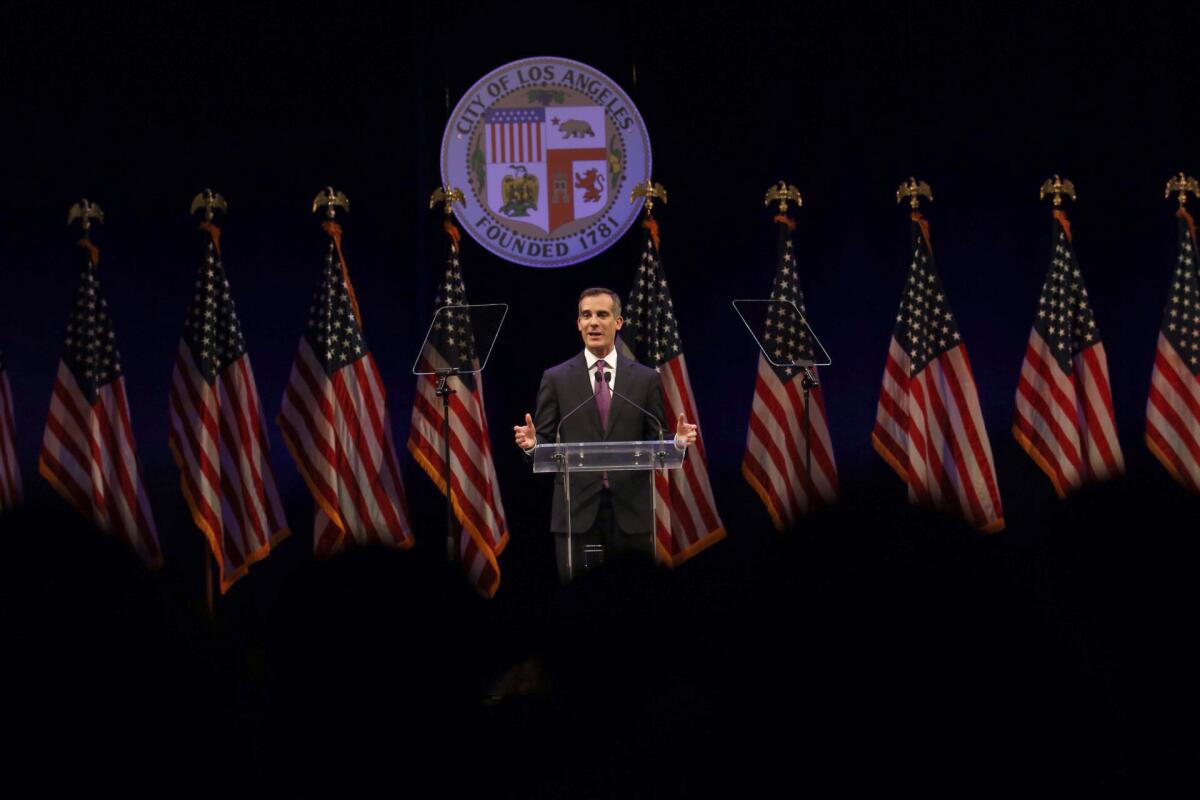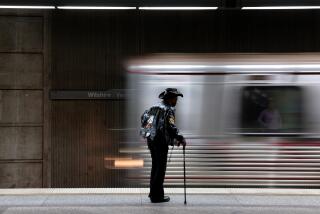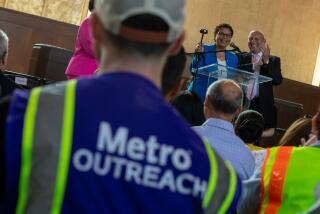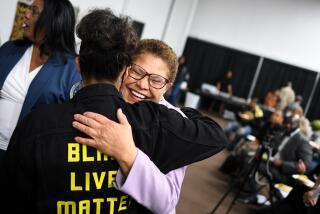State of City: Garcetti focuses on public safety; wants Uber, Lyft at airport

Los Angeles Mayor
- Share via
The Los Angeles Police Department will reassign hundreds of officers to new roles in mobile crime-fighting and community policing, a broad reorganization effort aimed at suppressing a surge in violent crime, Mayor Eric Garcetti announced during his 2015 State of the City speech Tuesday night.
The changes will shift 200 officers from elsewhere in the department to the Metropolitan Division, an elite unit that deploys its members across the city based on crime patterns. An additional 40 officers will be reassigned to create a new community policing division, Garcetti said.
The mayor said the reorganization comes in response to sharp rises in violent crimes and property crimes this year. Last month, the LAPD reported a 27% increase in violent crimes and 12% increase in property crimes compared to the same period in 2014.
“As long as I’m your mayor, I won’t duck bad news,” Garcetti said. “I’m going to own it.”
The changes were among the new public safety initiatives that headlined the mayor’s second State of the City speech, delivered at Cal State Northridge. During the broad-ranging address, which lasted nearly an hour, Garcetti recounted accomplishments of his first two years in office and elements of his agenda he is still pursuing.
Among the ongoing initiatives the mayor cited is a proposal to raise the city’s minimum wage and mandate the strengthening of buildings that could collapse in a major earthquake. In the San Fernando Valley, where Garcetti chose to deliver his speech, the latter topic has special resonance for residents who suffered the worst effects of the 1994 Northridge earthquake.
He said he hopes a major earthquake “will not happen during my time as mayor, and God willing, not in our lifetimes. But it will happen. It’s overdue.”
The mayor announced new technology-related policy proposals that could prove controversial: Collecting taxes from the vacation-rental company Airbnb and allowing the ride-share services Uber and Lyft to pick up customers at Los Angeles International Airport. (Currently, the app-based ride services can only pick up limited numbers of passengers at LAX.)
On a more pedestrian note, Garcetti pledged to place 5,000 new trash cans in the city to help remedy what he called “dirty streets lined with broken TVs and abandoned couches.”
Jaime Regalado, emeritus professor of political science at Cal State L.A., said Garcetti “did what he had to do” in the speech by absorbing disparate themes — litter, violent crime and economic issues — into the “Back to Basics” agenda he ran on in 2013. In response to critics who have attacked Garcetti’s promise to improve basic city services as lacking in vision, Regalado said, the mayor has stretched the definition of basics to include a wider array of social issues.
“He’s given us some definition now, broadening the approach,” Regalado said. “He’s bringing larger things under that umbrella of ‘Back to Basics.’ “
In addition to the reassignment of 240 officers within the LAPD, Garcetti said he intends to double the number of civilian workers who serve on domestic violence response teams alongside police officers and increase funding for anti-gang initiatives. Details of many of the changes — including what the reassigned police officers’ roles will be and what divisions they will come from — have yet to be made clear. But City Council members who attended the speech expressed support for the public-safety announcements.
“It makes sense to elevate our efforts by forming a division on community-based policing,” said Councilman Joe Buscaino, who served in the LAPD. “As a former senior lead officer, I understand the importance of forming relationships,” he added. “The mayor’s goal of elevating our police commitment is the right thing to do.”
The proposal to allow Uber and Lyft greater access to the airport — a move that has been fiercely resisted by taxi companies — got a cooler reception from some officials.
Councilman Paul Koretz said he was horrified by the idea of Uber and Lyft picking up passengers at the airport.
“I’m not necessarily a big fan of the cheating economy,” Koretz said, arguing that ride-share services need to adhere to the same regulations as taxicabs. He said he and the mayor are “on opposite directions on that.”
Garcetti’s call for taxation of Airbnb room and home rentals mirrors efforts in cities across the country to more tightly regulate such services, which have exploded in popularity and increasingly compete with conventional hotels and, in some instances, drive up real estate prices.
Garcetti said new revenue collected from Airbnb would supply half of an additional $10 million he hopes to allocate to the city’s affordable housing trust fund.
“We’ve been working with cities across the country and around the world to help our community pay hotel and tourist taxes and we’re continuing to have productive conversations with officials in Los Angeles,” Airbnb said in a statement after the speech.
More to Read
Sign up for Essential California
The most important California stories and recommendations in your inbox every morning.
You may occasionally receive promotional content from the Los Angeles Times.












